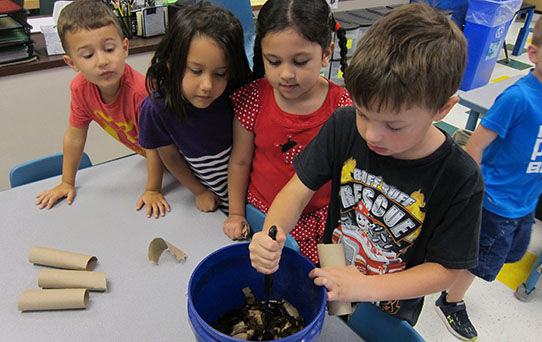 Coles Elementary School is an environmentally-oriented school with many sustainability programs in place that help reduce their carbon footprint. They have recently added a schoolwide composting program. With all students involved, the program is the first of its kind in the school division.
Coles Elementary School is an environmentally-oriented school with many sustainability programs in place that help reduce their carbon footprint. They have recently added a schoolwide composting program. With all students involved, the program is the first of its kind in the school division.Kindergarten teacher Ramona Richardson has led many of the sustainability programs at Coles Elementary. The composting program has been on the school's radar for a while, but funding has been a challenge. After hearing about the initiative, the school division's Office of Energy Management and Sustainability stepped in to fund two industrial-sized composting tumblers.
"With the schoolwide composting program, our students learn that they can make a difference in making less trash by recycling their organic food waste, and in the process, make compost which will enrich the soil in our nine school gardens," Richardson said. "A child old enough to throw trash away is old enough to sort paper from plastic, turn off lights when not in a room, and learn how to compost. We teach that caring for our environment is a part of our daily routine and not just reserved for Earth Day."
Colgan High School junior Daniel Buongiovanni jumped at the opportunity to help with the composting program too; his contributions are part of his Eagle Scout project for the Boy Scouts.
"I wanted to do my project there because my siblings and I have been attending Coles for the last 10 years," Daniel shared.
Daniel organized and led his scout troop in assembling the composting tumblers. He also obtained two trash barrels and adapted them to collect the organic food waste from the cafeteria. Flyers, designed by Daniel, are posted on the barrels to remind students which foods can and cannot be collected. A visual flow chart shows the path that the diverted food waste will take once it leaves the school's cafeteria.
The school will be conducting an audit at the end of the school year to determine how much food was recycled and how much compost was created for their gardens.
